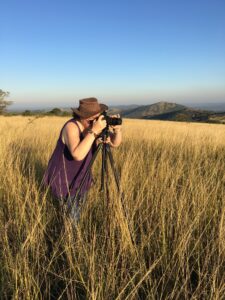Martine Labbé’s journey is a testament to the power of resilience, creativity, and community. As a musician who navigated the challenging landscape of jazz school and the male-dominated music industry, she has transformed her experiences into a platform for empowerment. Now, through her work as a coach, consultant, and founder of 3ZEM Prod, Martine channels her passion for music into creating spaces for artists to thrive. Her story is one of using personal challenges as a catalyst for positive change, inspiring others to find their voice, embrace their uniqueness, and build connections that transcend borders.
- Can you share the journey that led you to combine your passion for music with your role as a coach and consultant?
As a musician that has gone through jazz school, with all that it entails, (think the movie “Whiplash”, less romanticized, with no grand winning finale and add the burden of being a woman in a male dominated context if you can imagine that) I really wanted to offer empowerment to fellow artists/organizers. I was extremely lucky to find some gems along the path that were absolutely wonderful teachers and models, but I have to say that the negative experiences definitely left their marks and I do not wish for that to happen to anyone. Therefore, it was really important for me to become a positive role model and help others empower themselves, so they empower others around them.
- What inspired you to create 3ZEM prod, and how did you identify the gap in the market you wanted to fill?
It’s basically fate of events. To put it simply, it just happened that we were looking for a rehearsal space. We were fortunate to find a room in a shared space with a theatre company. They told us that we could use the common space where they had a stage and we thought, why not? Coming from Montreal, Canada, I had experienced all kinds of alternative spaces where people gather and exchange in community and learn from one another, I couldn’t find that in Rabat, Morocco outside of perhaps one space that is managed by a big institution. I thought, we need something by the people, for the people. It was an instant hit, we gathered people from all kinds of backgrounds, started organizing shows and workshops. We quickly were spotted by bigger structures, the Canadian embassy and Quebec’s bureau among others and started working as a bridge between cultures, facilitating residencies for Moroccan and Canadian artists to meet and create together.
- How has your background in music influenced your approach to coaching and consulting?
I do believe that music is no different than life, that it teaches lessons and helps you become a better person, if you’ll allow it. My coaching is really geared towards empowerment because I deeply believe that any voice needs to be heard. An empowered artist has the most authentic and powerful voice they can have. In my consulting, I’m always trying to hear the client – most often an organizer, or institution – and have them understand the intricacies of the musician’s work, and what their needs are. My goal is always to get the best result possible for both parties and that involves everyone’s well-being. As a musician, I know I create my best work and give my best performances when the conditions are smooth and the teams are caring, that’s what I’m looking to create as a consultant.
- What were some of the most challenging experiences you faced while pursuing a career in music, particularly in a male-dominated environment?
To be blunt: abuse, harassment and sexual violences. Finding allies was difficult at times AND it helped me grow immensely. We deserve to be safe and I’ve learned to create my safety instead of looking for it in others/institutions, although I really believe institutions should be responsible to create safety for everyone. Another thing that was hard is that there is this (or was, I don’t know if it’s still the cas) that in music, men are good until proven otherwise, and women are bad until proven otherwise, I often felt it. As well as being kicked out of projects for having boundaries or being hired for my body, and not my skills. This is a man’s world, as they say!
- Can you describe a moment when you felt particularly proud of the work you’ve done with 3ZEM prod?
Every single time we’ve managed to take an artist or a band on the road in another country (Canadians in Morocco, Moroccans in Canada), I’ve felt so much pride. Working for artist’s mobility is deeply important for me. One time in particular, we had a Moroccan rapper come to Montreal, it was his first time in North America, the diaspora came from as far as Toronto and New York, the room was filled to the brim with fans. This one is an especially fond memory, having moved abroad and help artists from my adoptive country perform in my home country is a feeling I could not describe. I’m really grateful for both my countries.
- How do you balance your personal well-being with the demands of running a cultural business and working in the arts?
I am tempted to write, laughingly, there is no key to balance but balance. I have to say that living in North Africa helped me slow down and enjoy more. I make sure that I do create space for what’s important for me, journaling, meditating, sports, etc, as well as making sure I develop and maintain personal relationships that are meaningful for me, outside of my family and partner. It is very easy for me to get into the work spiral, because as an artist, we are never done. I learned to put myself some limits in terms of time and spaces as well. What I mean by that is, as an immigrant, I would use a phone and messaging app to communicate with family and friends, therefore I refuse to work on that same app. I gotta keep the work contained where I can choose when I access it.
- What strategies do you use to maintain your mental health and manage stress in the high-pressure world of music and business?
I have been in therapy all of my life, on and off, depending on the phases. I would say that for me, it’s absolutely necessary to keep healthy. Then it’s about prioritizing what I know I cannot go around: food and sleep for me will do the trick, even in the busiest times. I’m lucky I can take naps anywhere (my mom says I could sleep on the tails of a running monkey), so I do take advantage of that, there’s nothing like a power nap to put everything back in order for me. I also make sure I carry healthy snacks around for all those times when I cannot find a moment to sit down and enjoy a meal, especially while touring or in the middle of a big event.
- How has your experience with jazz school shaped your approach to working with artists and musicians today?
Benevolence, benevolence, benevolence. What jazz school thought me, unfortunately and fortunately at once, is that you don’t get anything out of someone you’ve outcasted. I don’t believe in the supremacy of bebop taught by white men thinking that this is the only way to play/learn jazz. For as long as I can remember, I was in touch with different cultural communities, Haitians, Jamaicans, Senegalese, etc. and they thought me sometimes more than jazz school, without reading or writing music. So do believe that jazz school showed me who I didn’t want to be. I approach any artist and musician with respect and care, curious of what I can learn from them, regardless of their background or “education”. Benevolence opens up people and you can just then sit back and enjoy the magic developing before your eyes.
9. Can you share an example of how 3ZEM prod has positively impacted an artist or community?
We’ve seen people speak their dreams into reality by sharing with our community. We’ve seen people choose this line of work and get involved in the music industry as cultural actors. We’ve seen people transform after attending workshops. I’ll leave you with a message we received just a couple of weeks ago: “I just want to thank the 3ZEM team for those wonderful days between 2018 and 2019. It was a beautiful experience that I will never forget! As a Rabatian citizen, 3ZEM has been a great source of inspiration for me, and I hope it will continue because there are so many amazing talents in Rabat but unfortunately there is no good fertile ground to plant and grow their ideas. 3ZEM is good fertile land and water at the same time!”
10. What role does compassion play in your work as a coach and in the ethos of 3ZEM prod?
I have to say that compassion is at the forefront of EVERYTHING I do! I have my moments, like everyone but it is an absolute essential for me. As a coach, one of my main thing is to bring people to nurture compassion for self. In the ethos of 3ZEM prod, working with different cultures, that’s our starting point. You might not understand the working condition of another country, for example, but if I am able to bring you into this compassion as a starting point, you will still enjoy your time and learn a lot.
11. How do you envision the future of 3ZEM prod and its impact on the art and cultural industry?
I would like to expand into having a physical location again, this is a big dream of ours. I wish it inspires other alternative music business in the city, in the country. I would love for Morocco to have a network of different independent cultural businesses that work together, to create healthy competition with the established, more founded institutions. I’m craving to witness the vitality of the scene in that context.
12. What advice would you give to other women looking to break into or make their mark in the music industry?
How radically yourself can you be? Be more of that! That’s when you’ll create your best work. Find the right people to surround yourself with, they have to be excited by everything you do, yet have constructive feedback and tons of ideas they’ll help you realize.
13. How do you handle criticism or setbacks, both personally and professionally?
Really trying to ground into Miguel Ruiz’ toltec agreement “don’t take things personally”. It’s not about me, it’s about what I trigger in them. Only once I am able to calm down and ground, I can decide to look at the criticism and choose if I want to take it into consideration or not. But really looking at other people as mirrors has helped me greatly. The same way I will get annoyed at someone for them showing up behaviours I dislike in myself, they will feel the same. Oftentimes, criticism is rooted in something someone feels, not in something I did or didn’t do.
14. What is one piece of advice you wish you had received earlier in your career?
I remember having a conversation with trumpet hero Ingrid Jensen. It was perhaps just a regular conversation to her, but it changed my world. I was so down on myself, having listened to all the bitter teachers on my path. As I was speaking, she would only reflect me back the positive. I would say I quit school, she answered that it was amazing that I started organizing community events in my free time. Over and over again. She taught me a lesson I really needed in that moment. POSITIVITY IS EVERYTHING. It’s not about refusing to see the negative things, but rather, where you put your focus. She helped me realize that I was giving a lot (if not all) of my attention to the negative things. That’s when I started practicing gratitude, finding things to be grateful for every single day. I wish I had started that earlier. It definitely was a game changer for me.
IG: @martine.trumpet
Website: https://www.martinelabbe.com/en/about/
TikTok: https://www.tiktok.com/@martine.trumpet
YouTube: https://www.youtube.com/@martine.trumpet
3ZEM Instagram: @3zem.prod






